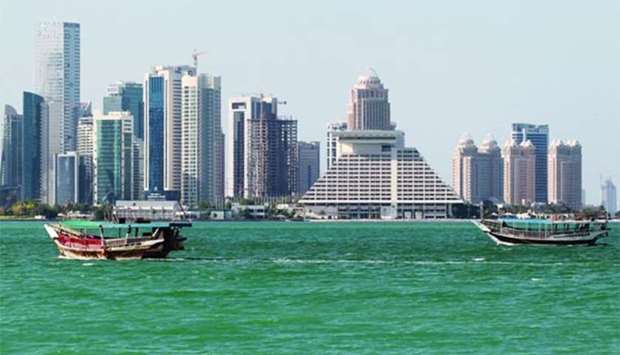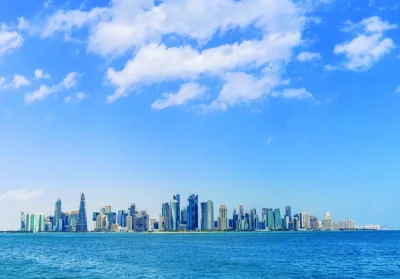Qatar’s non-oil economy looks set to comfortably avoid a recession as the “initial shock” to the system via disrupted trade and financial flows has eased, National Bank of Kuwait (NBK) has said in its latest report.
The second quarter 2017 GDP data incorporate nearly one full month of crisis-affected data, and show that non-oil growth slipped to just 3.9% year-on-year (y-o-y), NBK said.
“If all of the slowdown in Q1 was attributed to the diplomatic dispute, then this would equate (hypothetically) to non-oil growth slowing to just 1.3% y-o-y over a full quarter. But it is also possible that the hit to growth will be smaller in subsequent months, as the initial disruption to activity wanes,” NBK said.
Although there are downside risks from an intensification of the crisis, NBK for now is maintaining its view that non-oil growth slowing to 4% this year and next, from 5.6% in 2016.
According to NBK, “fears of a major inflation-busting spike in food prices due to restricted imports from neighbouring Saudi Arabia have so far not materialised,” likely helped by the recovery in imports.
Food price inflation did jump from 0% y-o-y in June to 4.5% in July, but this was less than feared and it has since eased back to 3.6% in September.
In fact, inflation overall slipped into negative territory in August at -0.4% y-o-y driven by renewed weakness in housing costs and weak ‘core’ pressures. Both of these are likely linked to crisis-related pressures.
Residential property prices had been undergoing a correction since early 2016, and though still down in year-on-year terms had more or less levelled off in H1, 2017. Since then, however, prices have taken another leg down, falling 9% between June and September – possibly attributable to a drop in confidence and a weaker economic climate.
Other asset markets have suffered too, with the local stock market falling 17% since the crisis began, making it easily the region’s worst performer. Other Gulf Cooperation Council markets are -7% to +8%, against a backdrop of greater optimism over the outlook for oil prices.
The report noted that Qatar’s credit growth remained encouragingly solid at 13% y-o-y.
Non-resident outflows, since June, have been more than offset by $28bn (+51%) in inflows from the public sector, pushing the latter’s share of total deposits to 37%. The net result of these flows has been to see overall deposit growth surge to 18% y-o-y in September from 12% in May.
NBK report showed that foreigners withdrew some $12bn (23%) of their deposits from Qatari banks since June, though the rate of withdrawal has slowed in recent months.
“If all of the slowdown in Q1 was attributed to the diplomatic dispute, then this would equate (hypothetically) to non-oil growth slowing to just 1.3% y-o-y over a full quarter. But it is also possible that the hit to growth will be smaller in subsequent months, as the initial disruption to activity wanes,” NBK said.
Although there are downside risks from an intensification of the crisis, NBK for now is maintaining its view that non-oil growth slowing to 4% this year and next, from 5.6% in 2016.
According to NBK, “fears of a major inflation-busting spike in food prices due to restricted imports from neighbouring Saudi Arabia have so far not materialised,” likely helped by the recovery in imports.
Food price inflation did jump from 0% y-o-y in June to 4.5% in July, but this was less than feared and it has since eased back to 3.6% in September.
In fact, inflation overall slipped into negative territory in August at -0.4% y-o-y driven by renewed weakness in housing costs and weak ‘core’ pressures. Both of these are likely linked to crisis-related pressures.
Residential property prices had been undergoing a correction since early 2016, and though still down in year-on-year terms had more or less levelled off in H1, 2017. Since then, however, prices have taken another leg down, falling 9% between June and September – possibly attributable to a drop in confidence and a weaker economic climate.
Other asset markets have suffered too, with the local stock market falling 17% since the crisis began, making it easily the region’s worst performer. Other Gulf Cooperation Council markets are -7% to +8%, against a backdrop of greater optimism over the outlook for oil prices.
The report noted that Qatar’s credit growth remained encouragingly solid at 13% y-o-y.
Non-resident outflows, since June, have been more than offset by $28bn (+51%) in inflows from the public sector, pushing the latter’s share of total deposits to 37%. The net result of these flows has been to see overall deposit growth surge to 18% y-o-y in September from 12% in May.
NBK report showed that foreigners withdrew some $12bn (23%) of their deposits from Qatari banks since June, though the rate of withdrawal has slowed in recent months.



